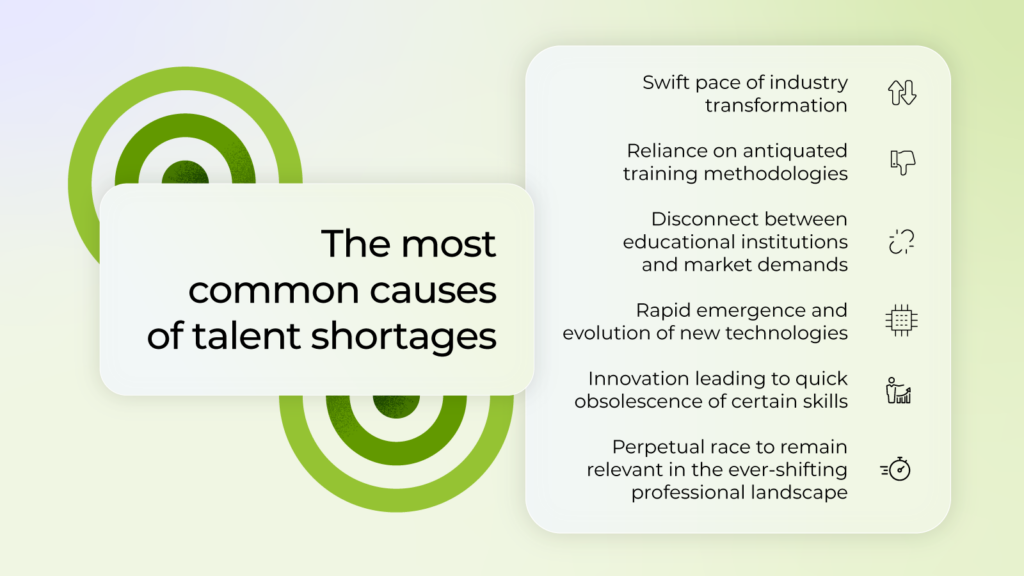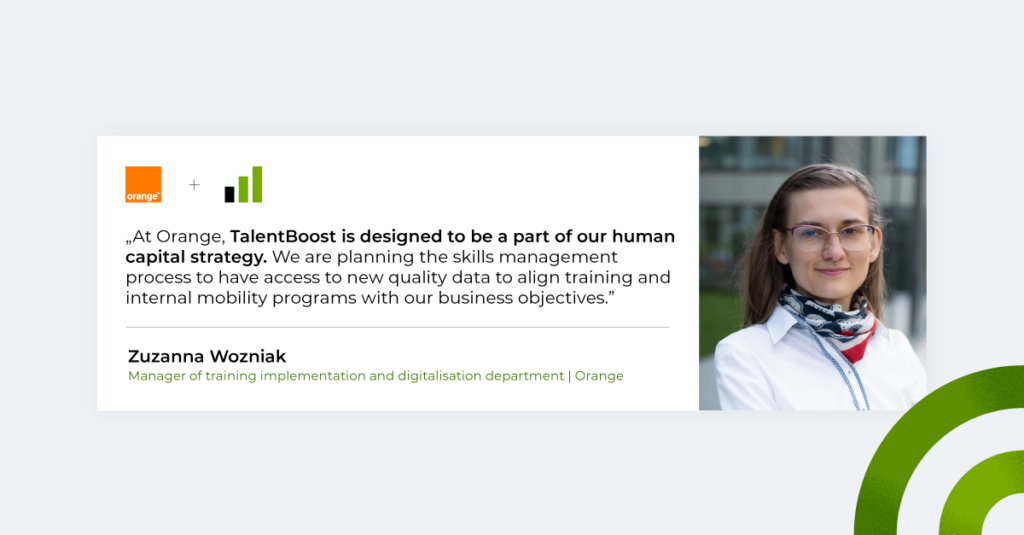How skills management platforms are shaping modern businesses

In the past, businesses anchored their talent assessment and development strategies in conventional HR methodologies.
These tried-and-true practices, while effective for their time, have been eclipsed by the accelerating pace of technological evolution and the sweeping transformations brought about by the digital age. Today, skills management software stands at the forefront of this change, evolving into indispensable assets for contemporary enterprises.
These platforms not only offer a more granular view of employee competencies but also provide dynamic pathways for nurturing and aligning talent to meet the ever-changing demands of modern business landscapes.
Understanding talent gaps
Causes of talent gaps
Organizations often grapple with talent gaps, which can be attributed to a myriad of factors. One significant contributor is the swift pace of industry transformation, which constantly reshapes the skill set required for success.
Coupled with this is the reliance on antiquated training methodologies that may no longer resonate with or effectively upskill the modern workforce.

Additionally, there exists a frequent disconnect between educational institutions and the real-world demands of the market, resulting in graduates who may not be fully equipped for contemporary roles.
Compounding these challenges is the rapid emergence and evolution of new technologies. This relentless march of innovation often means that certain skills can become outdated almost as quickly as they are acquired, creating a perpetual race to remain relevant in an ever-shifting professional landscape.
Impact on businesses
Talent gaps, when left unaddressed, can pose significant threats to an organization’s trajectory and market standing.
Firstly, a deficiency in the necessary skills can directly impact productivity, with tasks taking longer to complete or not meeting the desired standards, leading to inefficiencies.
Furthermore, these gaps often translate into escalating operational costs; businesses might find themselves investing more in training, external consultants, or even in rectifying mistakes that arise from skill deficiencies.
Most critically, talent gaps can blindside an organization to emerging opportunities in the market. Without the requisite expertise on board, companies may lag in innovation, miss out on potential ventures, or fail to capitalize on new trends, thereby ceding ground to more agile competitors.
In essence, talent gaps are not just internal challenges but pivotal factors that can shape an organization’s external market dynamics.
Skills management platforms: The game changer
Key features
Talent management software also stands out as a beacon for organizations seeking to harness the full potential of their workforce. These platforms are not just digital tools; they are intricate ecosystems endowed with a plethora of cutting-edge features, meticulously crafted to enhance talent development at every level.
At the heart of these platforms is the capability for real-time skill gap analyses. This functionality delves deep into skills data, offering instantaneous insights into any existing skill discrepancies within the workforce. Such pinpointed clarity enables organizations to swiftly address areas that may be lagging.
To bridge these identified gaps, the software meticulously designs personalized learning pathways. This ensures that every employee is not just trained but is also provided with a learning experience uniquely tailored to their specific needs, aspirations, and potential.
The prowess of these platforms is further amplified by the integration of artificial intelligence. With AI at the helm, they not only respond to the current needs but also anticipate them. They proactively make data driven furnish recommendations, forecasting impending skill necessities and suggesting courses or modules that align perfectly with these projections.
But the capabilities don’t end here. The platforms are also fortified with potent data analytics capabilities. This empowers businesses with the ability to continually track and assess the progression of their talent development initiatives. Organizations can gauge the effectiveness of their various training programs and modules, derive actionable insights, and subsequently, make strategic decisions that align with their long-term talent objectives.
In essence, by capitalizing on the multifaceted offerings of skills and competency management software, organizations position themselves to address not just the immediate skill voids but also to future-proof their workforce. This proactive approach ensures that businesses remain at the vanguard of their industries, poised to navigate the complexities of an ever-shifting professional terrain.
Benefits for organizations
Skills management platforms are revolutionary tools that provide businesses with multifaceted advantages, streamlining and enhancing various aspects of employee development.
Firstly, they champion the ethos of continuous learning and development, ensuring that employees remain updated, relevant, and primed for success in their roles.
When it comes to recruitment, these platforms act as invaluable aids, fine-tuning the hiring process by precisely matching candidates to positions based on the specific skill sets needed, thereby optimizing the fit and reducing the onboarding time.

Beyond hiring, the platforms play a pivotal role in bolstering employee engagement and retention. By offering tailored growth paths and recognizing skill advancements, they instill a sense of purpose and value in employees, leading to higher satisfaction and loyalty.
Finally, in an era where innovation is the bedrock of competitive advantage, skills management software ensures that teams are well-equipped to navigate and capitalize on the flux of changing markets.
By identifying and addressing skill gaps in real-time, they guarantee that businesses remain agile, proactive, and ahead of the curve, ready to seize emerging opportunities.
Implementing a skills management platform in your business
Steps to effective skills management
Assess organizational needs
Start by conducting a comprehensive audit to pinpoint the primary skill requirements of your organization. This involves understanding both current demands and forecasting future needs based on business goals and industry trends.
Select the right platform
With the skill needs identified, delve into researching skills management platforms that best align with these requirements. Look for skill management platforms that offer scalability, user-friendliness, and robust analytics, ensuring they can adapt as your organization grows.
Equip your teams
Once the platform is in place, prioritize training for HR and management teams. Ensure they’re adept at leveraging all the features of the platform, from skill gap analysis skills tracking to personalized training pathways. Their proficiency will be key to maximizing the platform’s potential.
Maintain relevance
The business landscape is in a constant state of flux. As such, it’s essential to regularly reassess the skills database, updating it to reflect changing organizational needs, emerging technologies, and industry shifts. Regular updates ensure that the platform remains a relevant and effective tool for talent management.
By methodically following these steps, businesses can ensure they’re not only addressing present skill gaps but are also primed to navigate future challenges with an empowered and skilled workforce.
Challenges to anticipate
Certainly, the adoption of skills management platforms brings with it a plethora of advantages for modern businesses. However, the journey isn’t without its hurdles.
One of the foremost challenges is resistance to change. Employees, and sometimes even management, can be hesitant to transition from traditional methods to a digital platform, either due to unfamiliarity or a perceived complexity of the new system.
Additionally, in an era where data breaches are increasingly common, ensuring the security of sensitive employee data on these platforms becomes paramount.
Businesses need to be vigilant and proactive in safeguarding this information, potentially necessitating investments in enhanced security measures. Lastly, the rapid pace of industry evolution means that today’s relevant skills might be outdated tomorrow.
Thus, businesses face the ongoing challenge of ensuring their chosen platform stays abreast of industry trends and shifts, requiring continuous monitoring and periodic updates. While these challenges are significant, with strategic planning and commitment, they can be effectively navigated, allowing organizations to reap the manifold benefits of skills management platforms.
Real-life success stories
Orange elevates employee potential and business growth with DevSkiller
Overview
Recognizing the shifting paradigms of the digital age, Orange, a renowned brand in the telecommunications sector, acknowledged the imperative of preparing its workforce for forthcoming challenges and opportunities. Aligned with this vision of fostering a future-ready team, Orange formed a strategic alliance with DevSkiller. Together, they initiated a groundbreaking skills management endeavor, aiming to seamlessly blend the workforce’s capabilities with the company’s progressive digital roadmap.
Key Objectives
- Equip employees with cutting-edge skills to unlock their full potential.
- Enhance job satisfaction, ensuring higher retention rates.
- Harmonize individual employee development trajectories with overarching company goals.
The DevSkiller impact
With DevSkiller’s robust platform, Orange successfully initiated “TalentBoost,” a program envisioned to be an integral pillar of their human capital strategy. This initiative aimed to provide employees with a comprehensive skill assessment and enhancement roadmap, tailored to both the individual growth of employees and the broader business objectives of the company.

Quote from Orange leadership
Outcome
Harnessing the robust features of DevSkiller, Orange embarked on a transformative journey that transcended traditional workforce development.
Instead of merely training its employees, the company bestowed upon them a forward-thinking skill set, prepping them for the challenges and innovations of tomorrow. This proactive approach had a ripple effect.
It didn’t just elevate the proficiency levels but also instilled a deeper sense of commitment and enthusiasm among the employees. The results were palpable — a workforce that was not only more competent but also deeply engaged, aligned with the company’s vision, and imbued with a renewed sense of satisfaction in their roles.
This synergy between Orange and DevSkiller showcases the profound possibilities that arise when companies prioritize strategic skills management. It serves as a clear illustration that the right investment in skills doesn’t just bolster individual capacities but also fortifies the broader scaffolding of organizational success.
Read more about Orange customer story here
Conclusion
In today’s dynamic business environment, where change is the only constant, the proficiency to quickly discern and address talent disparities is of utmost importance.
Skills management platforms, equipped with state-of-the-art functionalities and an analytics-centric methodology, present an invaluable answer to this challenge.
Beyond their utility as mere technological solutions, these platforms stand as integral strategic pillars, capable of steering the trajectory of success for contemporary enterprises, ensuring they remain at the forefront of their industries.
Discover how DevSkiller skills management platform can help you.
Schedule a demo with one of our product experts or watch this quick 5-min demo video to find out more.
FAQs
- What are skills management platforms?
They are digital platforms designed to identify, assess, and develop the skills within an organization. - How do they help in bridging talent gaps?
They provide real-time insights into existing skill sets, identify gaps, and offer tailored training solutions. - Are these platforms suitable for small businesses?
Yes, many platforms are scalable and cater to businesses of all sizes. - How often should the skills database be updated?
Regularly. As industries evolve, it’s essential to keep the skills database current to stay competitive. - What’s the ROI on investing in a skills management platform?
While the exact ROI can vary, businesses generally witness improved efficiency, reduced training costs, and higher employee retention rates.
Share post